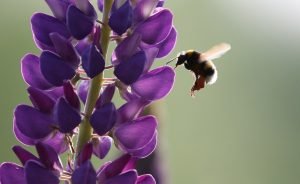Chickpeas and opium poppies are just two of many valuable niche crops that could be grown in the UK to help farmers diversify and build soil health within the rotation. Support for novel crops within the arable rotation has gained £1M investment from UKRI and exploratory projects from its Seeding Awards programme are to report their initial findings in a workshop coordinated by Agri-TechE on 23rd February 2022.
Dr Belinda Clarke is director of Agri-TechE, an industry membership organisation facilitating the growth of the agri-tech innovation ecosystem. She explains the opportunity to diversify: “Just 30 of the 370,000 known species of plant underpin the world’s food supply and these plants have been bred mostly for yield, not for taste, nutritional value or resilience.
“Additionally, gaining a high grade in cereals such as wheat requires intensive inputs of fertiliser and other synthetic chemicals, and we are looking to move towards reducing these inputs by building soil health through alternative patterns of cropping.
“Historically we grew a wider range of crops in the UK and over recent years there has been interest in growing more peas and beans and a wider range of cereals such as oats and rye, but there are a number of obstacles. There needs to be sufficient, reliable market demand, expertise on-farm for growing the crop and investment in specialist cultivation and processing equipment.
Convergence of technologies to overcome obstacles

“The convergence of technologies in agri-tech, such as lightweight robotics with specialist attachments and advanced breeding techniques for screening and selecting desirable attributes, means that there is now an opportunity to investigate the potential greater diversity in the rotation, but an industry-led approach is needed to include all elements of the value chain.”
Dr Lydia Smith, Head of the NIAB Innovation Farm, has recently co-authored research on behalf of Defra which looks at the potential of a range of crop plants for horticulture and broad field cultivation, ranking them across a number of criteria including market potential. One of these crops is poppies.
She says: “Seeds from the opium poppy (Papaver somniferum) are used as a food ingredient for bakery and also for pharmaceutical use in painkillers. The latter has a value of £1,000/ha (2016 prices). It has potential to be grown as a break crop in cereals, enabling more effective management of blackgrass and providing much needed resources for pollinators. Additionally, as it is sown in late spring it avoids the problems of cultivation during winter flooding. There are a number of established markets and knowledge has been built up over two decades by the Poppy Growers Association.
“There are many opportunities like this for diversifying the rotation with benefits to soil health and farm profitability and I am looking forward to exploring this further at the workshop.”
Seeding Awards to support introduction of new crops

James Phillips, Senior Portfolio Manager for BBSRC, agrees; he has worked to invest £1M at leading ten UK Universities and Research Institutes in Seeding Awards that will support short pump-priming projects aimed at exploring the potential of new crops and varieties for the UK arable rotation. At the workshop the progress will be reported with the aim of stimulating new public-private partnerships that may progress to future funding initiatives.
James explains that the Seeding Awards are closely aligned with UK government plans to progress towards a more sustainable and biodiverse agriculture.
“Introducing novel crops with the arable rotation is recognised within ELMs as an important part of improving sustainability and resilience in the farming sector as well as meeting ambitions for soil health and biodiversity. Advances in bioscience are now giving us the opportunity to re-evaluate some of these older crops and climate change makes others viable for introduction.
“The Seeding Awards were designed to enable BBSRC to quickly invest in building capability in Universities and Research Institutes and we are now looking to gain input from a wide range of industry partners at this workshop coordinated by Agri-TechE.”
James gives the example of lupins as an alternative to imported soya that provides benefits to soil structure and nitrogen fixing. Others include: protein crops such as flava beans; fibre crops such as hemp and flax; cereals including quinoa; teff; and oilseeds like linseed.
The Agri-TechE event “Novel Crops and Fresh Thinking” is to be held at Wivenhoe House Hotel, Wivenhoe Park, Park Road, Essex, CO4 3FA on 23rd February 2023. It will include presentations by Dr Lydia Smith and some of the 10 Seeding Award winners, together with a workshop for those interested in the business opportunities across the value chain that will arise from these new crops.












